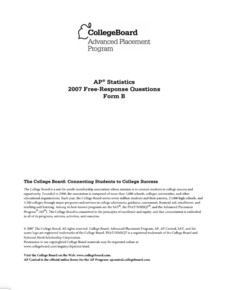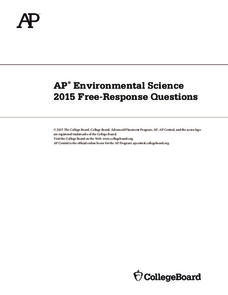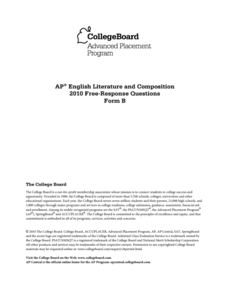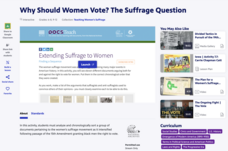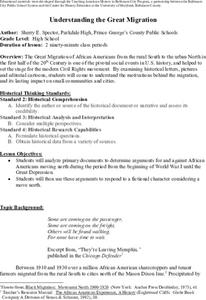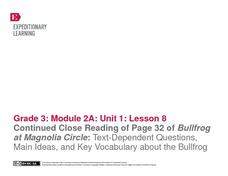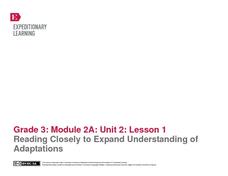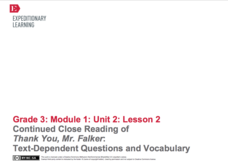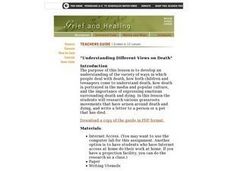CCSS Math Activities
Smarter Balanced Sample Items: 6th Grade Math – Target I
Scholars apply their knowledge of statistical questions to determine which questions meet the criteria. Grade 6 Claim 1 Item Slide Shows offers a couple of practice problems for scholars to discuss.
Novelinks
Things Fall Apart: Bloom’s Taxonomy
Promote critical thinking and literary analysis with a short activity. Readers of Chinua Achebe's Things Fall Apart respond to a series of questions modeled on Bloom's Taxonomy.
Tell City Schools
The Cay
Support your instruction of The Cay by Theodore Taylor with this extensive unit of materials. Provided here are prereading activities, worksheets and discussion questions for the entire book, and reading quizzes that you can use to check...
College Board
2007 AP® Computer Science A Free-Response Questions
Stay tuned for a programming announcement. The resource contains the four free-response questions from the 2007 AP® Computer Science exam. Teachers and pupils use the questions to understand how topics appear on exams. The items cover...
College Board
2007 AP® Statistics Free-Response Questions Form B
So that is how they do it! Pupils and teachers see how College Board assesses topics using the free-response questions from Form B of the 2007 AP® Statistics test. The six questions are divided in two sections, the first five being more...
College Board
2008 AP® Human Geography Free-Response Questions
Interpreting demographics is no easy task. From the reason more girls go to school around the world to why people move within their own countries, the issues are complex. Short-answer prompts help learners unravel the questions as well...
College Board
2001 AP® Statistics Free-Response Questions
Develop a complete understanding of the course. Pupils and teachers use the six free-response questions to gather information about aspects of the AP® Statistics course. The resource and test section show how items cover the content. A...
College Board
2015 AP® Environmental Science Free-Response Questions
Less than eight percent of AP Environmental Science test takers earn the highest score possible. Help scholars improve their scores by using actual test questions on water quality and urban planning before reading sample responses that...
College Board
2010 AP® English Literature and Composition Free-Response Questions Form B
Home is where the heart is. The 2010 AP® English Literature and Composition Free-Response Questions Form B require scholars to think about what home really is. They look at how a character leaves home, yet home remains within the...
Judicial Branch of California
Understanding the Declaration of Independence
Help pupils actively read the Declaration of Independence with a variety of activities in the resource. They storyboard and participate in a skit, an activity where they translate the Declaration of Independence, and respond to...
College Board
2006 AP® Calculus AB Free-Response Questions Form B
An exam divides the six free-response questions into calculator use and no calculator use items. The non-calculator items are conceptual in nature and test whether pupils understand the calculus concepts. Scholars explain their answers...
PBS
Why Should Women Vote? The Suffrage Question
An online interactive activity asks learners to analyze a group of documents related to the women's suffrage movement and then place the documents on a timeline. The results assess users understanding of the progression of the women's...
Florida Department of Health
Understanding the Risk of Substance Abuse Unit
Teenage brains are different! Understanding that the teenage brain is still developing and thus more impacted by substance abuse is the key concept in a three-lesson high school health unit. Participants learn about how the brain and...
Center for History Education
Understanding the Great Migration
What would make someone leave home and travel thousands of miles to find another one? Young historians look at letters, demographic data, and artwork to answer the question for the Great Migration, or the movement of thousands of African...
Curated OER
Responding to Open-Ended Questions using RASP
Young scholars learn how to answer questions correctly. In this writing lesson, students learn the acronym RASP and view model responses for each part of the writing strategy. Young scholars practice using the RASP model to answer...
Curated OER
Writing Questions
While this activity involving formulating questions was designed for older ESL students, it could be modified for use in upper elementary. Using this 15 questions instructional activity, students practice taking information and forming a...
EngageNY
Close Reading of Bullfrog at Magnolia Circle: Text-Dependent Questions, Main Ideas, and Key Vocabulary about the Bullfrog
As your 3rd grade class finishes reading Bullfrog at Magnolia Circle, the eighth lesson plan of this unit helps readers from an understanding of the very specific information on the final page of the book. As with the entire unit,...
EngageNY
Continued Close Reading of Bullfrog at Magnolia Circle: Text-Dependent Questions and Vivid Words and Phrases
As 3rd graders continue reading Bullfrog at Magnolia Circle, they focus on the concepts of predator and prey in the fifth lesson plan of this unit. Scholars further develop their ability to answer questions using evidence from the text...
Curated OER
Answering Carnival Questions with the Scientific Method
Through the use of a Reading Rainbow episode, clever in-class games and activities, and an ITV Series video, second and third graders engage in a study of the scientific method; what it is, and how scientists use it. This well-designed...
EngageNY
Reading Closely to Expand Understanding of Adaptations
Third graders work to determine the main idea, recall key details, and answer questions using an informational text on the topic of animal adaptations. Using the non-fiction text "Staying Alive: Animal Adaptations" (provided) the teacher...
Curated OER
Maus: Cubing Questioning Strategy
Maus is the text for a postreading activity that has class members using a cubing strategy to analyze, in depth, topics (racism, past and present, forgetting/remembering the Holocaust, representing the Holocaust) associated with Art...
EngageNY
Continued Close Reading of Rain School: Text-Dependent Questions and Vocabulary
The engaging story Rain School is further explored in the third lesson of a larger unit that explicitly teaches close reading skills by answering questions whose answers can only be found inside the text. Through teacher modeling and...
EngageNY
Continued Close Reading of Thank You, Mr. Falker: Text Dependent Questions and Vocabulary
In the second lesson plan in a series that revolves around the story, Thank You, Mr. Falker, learners practice the skill of answering direct questions from the text while using complete sentences. After a teacher-led review of how to...
Curated OER
Understanding Different Views on Death
A thought-provoking lesson presents how different cultures view death. Upper elementary through high school pupils engage in a series of activities that will leave them with a new understanding of how death is dealt with globally....






